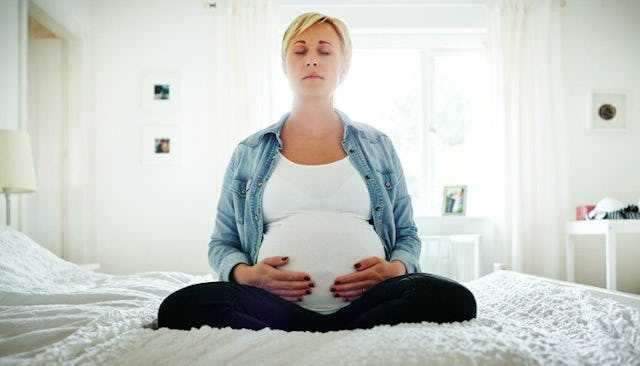Statistics Used To Reassure Me, But Then I Became a Mother

My first pregnancy ended in an early miscarriage. I was terribly sad and disappointed, but I hadn’t had much time to wrap my head around the idea of being pregnant yet, so it wasn’t as devastating a loss as it could have been.
We conceived again three months later, and that was when I really began to feel the emotional effects of the miscarriage. I was terrified it was going to happen again. Every twinge had me running to the bathroom to see if there was bleeding, and when I did actually start spotting around 8 weeks, I was utterly convinced I was going to lose this pregnancy too.
I managed to stop sobbing long enough to call the midwife to talk it through with her. She calmed me down in the remarkable way that women who are used to dealing with hormonal crazy people are able to do. I stopped by the birth center, and they did a totally unnecessary ultrasound just to reassure me. We found a tiny heartbeat, and I felt so much better, for about an hour before the irrational fear started creeping in again.
It was going to be a long 40 weeks if I couldn’t stop constantly thinking about miscarriage. So I took a deep breath, did some research, and found a tool to help me compartmentalize my fears and relax a little: statistics. I found the stats of how likely miscarriage was during each week of pregnancy and celebrated each milestone until the number was so minuscule I finally felt safe. Statistics had always been my friends to help with anything from calming my fear of flying to convince myself surgery was the right choice. It worked as usual, and I made it to delivery without losing my mind worrying.
When my son was born, I felt the same anxiety that I’m sure has plagued parents since the beginning of time. I had brought a tiny life into the world and was now going to live in perpetual terror of something bad happening to him.
SIDS, in particular, is nature’s cruel joke on new parents. The baby is finally asleep. You should get some sleep too. But even if you spend your whole day protecting him from absolutely everything, he might just stop breathing while you’re not watching him. Combine the potential of SIDS with the fear of car accidents, earthquakes, and the latest scare memes that were making their way across Facebook (“Baby Dies After Being Kissed On Mouth” or “112 Things in Your House Right Now That Could Kill Baby), and I was an anxious mess. I could barely function.
So I turned to my old friends, statistics, for some reassurance. I began to feel panic set in when I realized they didn’t comfort me the way they used to. There’s less than a 1% chance of him dying from SIDS? That means it fucking happens.
As a mother, I found it much harder to focus on the fact that something was unlikely instead of focusing on the fact that it happens. Somewhere out there, whatever unspeakably horrible thing I’m thinking about has happened to the child of a mother just like me. Any risk was unacceptably disturbing. This realization sent me into a tailspin of parental anxiety.
In those early months, I obsessively worried about everything all the time. And I don’t just mean reasonable stuff like SIDS. I mean my husband would take the baby with him to walk the dogs, and I would worry about them getting hit by a car and dying in the five minutes they were outside. When I was home alone with the baby, I would sometimes worry about what would happen to him if I randomly had a stroke and died. He would cry for hours before his dad got home. Would he be safe until then? The fact that I had died in this scenario wasn’t the important part — it was the fact that my helpless tiny love would be defenseless without me.
Looking back on it, I probably should have sought professional help, but I reached a healthier place on my own. Maybe my hormones settled, and that helped. Maybe it was something all new mothers experience. I’m beginning to find ways to push the scary statistics out of my mind. This crippling fear is what people don’t warn you about when you’re going to become a parent.
How do we live with the knowledge that the evil statistics are lurking out there without letting it make us crazy?
Accept that worrying isn’t going to stop bad things from happening, but it will stop us from enjoying this amazing time with our little ones. Something is going to get us all in the end, and no one gets to the end of the journey unscathed. I don’t want to shut out the wonderful experiences of the world for him by trying to keep out the bad. All I can do is surround him with all the love and joy that I feel, make sure his car seat is installed correctly, and focus on all the good in the world when the fear becomes too much to handle.